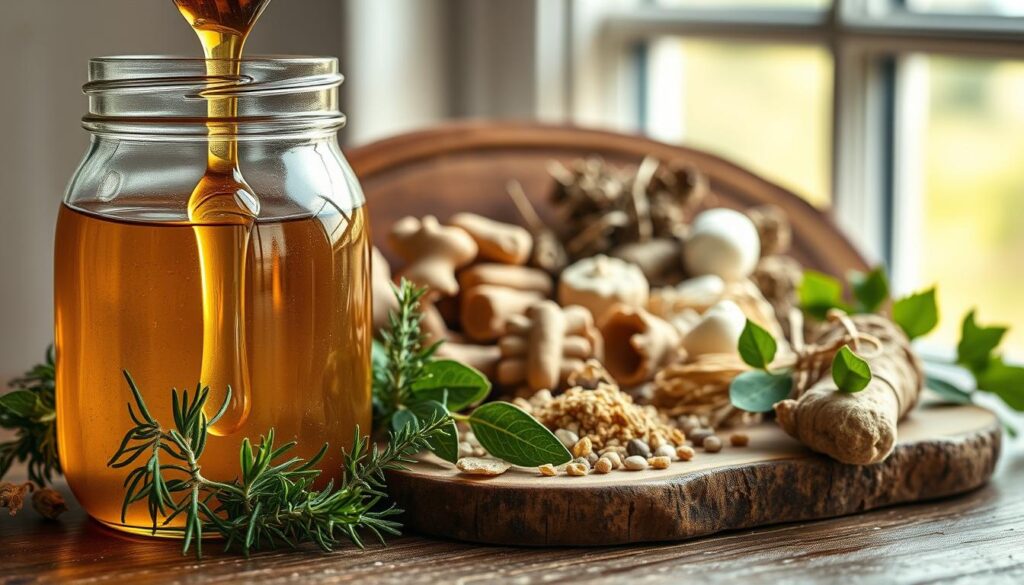Physical Address
304 North Cardinal St.
Dorchester Center, MA 02124
Physical Address
304 North Cardinal St.
Dorchester Center, MA 02124

Did you know that 50% of Americans lack enough magnesium, a mineral vital for muscle function and stress relief? This deficiency often leads to fatigue, cramps, and sleep issues—problems many treat with store-bought pills. But nature offers solutions too.
Science now backs traditional natural remedies. Turmeric, for example, contains curcumin, which studies show matches some anti-inflammatory drugs for arthritis pain. Ginger and capsaicin (found in chili peppers) also reduce swelling and discomfort.
Yet, safety matters. Eucalyptus oil may soothe congestion but trigger asthma attacks. Always check dosage—500mg of curcumin supplements differ from 2-5g of turmeric powder mixed with black pepper for absorption.
While these options help mild symptoms, severe cases need a doctor. Balance is key: spinach and almonds boost magnesium, but chronic pain may require medical attention.
Turmeric and ginger aren’t just spices—they’re natural healers. Used for over 4,000 years in Ayurvedic medicine, turmeric’s vibrant yellow hue comes from curcumin, a compound making up just 3% of the root. To match the potency of supplements, pairing turmeric with black pepper boosts absorption by 2,000%.
A 2019 study found 500mg of curcumin relieved arthritis pain better than 50mg of diclofenac sodium, a common medication. For daily use, mix ½–1½ teaspoons of turmeric powder into warm water or smoothies for 4–8 weeks. Note: Excessive amounts may stain surfaces or interact with blood thinners.
Ginger blocks inflammatory compounds like prostaglandins while soothing digestion. For a quick remedy, steep sliced raw ginger in hot water with lemon and honey. This brew eases morning sickness and tension headaches. However, those on blood thinners should consult a doctor first.
A spoonful of honey might be the oldest trick in the book—but science confirms its power. Research from the Mayo Clinic shows honey coats the throat, reducing irritation and suppressing coughs better than many over-the-counter syrups. For quick relief, stir 1 tablespoon into warm water or herbal tea.

Mix honey with lemon juice and warm water to break down mucus. The acidity soothes inflamed tissues, while honey’s antibacterial properties tackle infections. Note: Never give honey to infants under 1—it risks botulism.
Elderberries pack flavonoids that block viruses. Simmer 1 cup dried berries with 3 cups water, strain, and add 1 cup honey. Take 1 teaspoon daily at the first sign of symptoms. Studies suggest it shortens colds by 2–4 days.
Alternatives: Echinacea works best when taken early, while pelargonium (Umckaloabo) may ease bronchitis. For bacterial sore throats, gargle with ½ tsp salt, ¼ tsp turmeric, and warm water twice a day.
Digestive discomfort affects millions, but simple kitchen staples can bring relief. From peppermint’s cooling effect to fenugreek’s fiber boost, these solutions tackle bloating, cramps, and irregularity without harsh chemicals.

Peppermint activates anti-pain channels in the colon, easing IBS symptoms like spasms. Studies show a 40–60% improvement in discomfort with daily use. For best results, steep 1–2 cups of medicinal-grade tea (like Traditional Medicinals) per day.
Note: Avoid if you have GERD—peppermint may relax the lower esophageal sphincter, worsening reflux.
Fenugreek’s soluble fiber adds bulk to stools, aiding digestion. It’s also prized by nursing mothers—2–3 cups of fenugreek tea daily may boost milk supply. However, its blood sugar-lowering effects mean diabetics should consult a doctor first.
When pain or skin issues strike, nature offers powerful solutions right from your pantry. Ingredients like cayenne pepper and tea tree oil target discomfort at the source, backed by research and centuries of use.
Capsaicin—the compound that makes chili peppers hot—works by numbing nerves. A 2020 study found it reduces pain by 50% in arthritis patients. Try this DIY cream:
Note: Wash hands thoroughly after use. Never apply to the face—it can cause severe irritation.
| Product Type | Capsaicin Concentration | Best For |
|---|---|---|
| OTC Creams | 0.025–0.1% | Mild joint or muscle pain |
| Prescription (Qutenza) | 8% | Chronic nerve pain |
Tea tree oil’s terpenes break down bacteria and fungi. A 5% dilution (5 drops oil + 1 tsp carrier oil) treats:
“Tea tree oil shows efficacy comparable to benzoyl peroxide for mild acne, with fewer side effects.” — Journal of Dermatological Treatment
Alternatives: – Arnica cream for bruises. – Calendula salve for eczema. Always patch-test new treatments to avoid allergic reactions.
Natural solutions offer relief, but knowing their limits ensures safe use. Nearly half of Americans lack magnesium, yet overdoing supplements like turmeric (>5g/day) risks side effects. Always patch-test topical remedies (e.g., capsaicin cream) and dilute essentials oils.
Disclose herbal use to your doctor, especially if taking medications or pregnant. Lavender, while great for sleep, may disrupt hormones if undiluted. Pairing magnesium-rich foods with stress-relief practices (like yoga) supports holistic health.
Track symptoms closely. Adjust dosages gradually, and seek urgent care for severe reactions. Tradition and science both matter—but safety comes first.